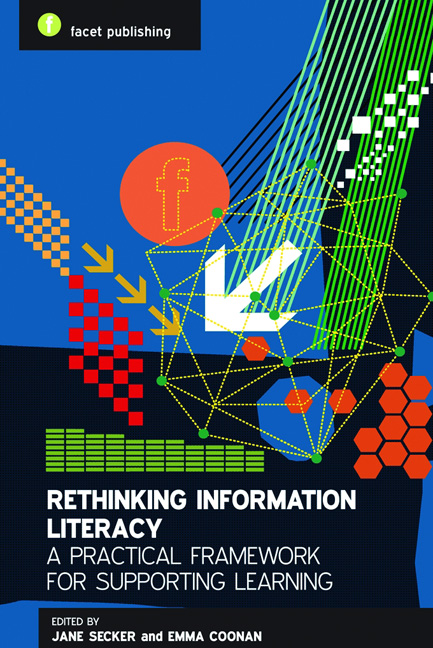Book contents
- Frontmatter
- Contents
- Acknowledgements
- Contributor profiles
- Introduction
- Strand One Transition from school to higher education
- Strand Two Becoming an independent learner
- Strand Three Developing academic literacies
- Strand Four Mapping and evaluating the information landscape
- Strand Five Resource discovery in your discipline
- Strand Six Managing information
- Strand Seven The ethical dimension of information
- Strand Eight Presenting and communicating knowledge
- Strand Nine Synthesizing information and creating new knowledge
- Strand Ten The social dimension of information
- Afterword: ‘Ownership is a flawed concept’
- Conclusion
- Appendix 1 A New Curriculum for Information Literacy (ANCIL): the curriculum
- Appendix 2 ANCIL Lesson Plan
- Appendix 3 ANCIL Institutional Audit: worksheet
- Appendix 4 ANCIL Institutional Audit: interview questions
- Index
- Miscellaneous Endmatter
- Miscellaneous Endmatter
- Miscellaneous Endmatter
- Miscellaneous Endmatter
Strand Nine - Synthesizing information and creating new knowledge
Published online by Cambridge University Press: 08 June 2018
- Frontmatter
- Contents
- Acknowledgements
- Contributor profiles
- Introduction
- Strand One Transition from school to higher education
- Strand Two Becoming an independent learner
- Strand Three Developing academic literacies
- Strand Four Mapping and evaluating the information landscape
- Strand Five Resource discovery in your discipline
- Strand Six Managing information
- Strand Seven The ethical dimension of information
- Strand Eight Presenting and communicating knowledge
- Strand Nine Synthesizing information and creating new knowledge
- Strand Ten The social dimension of information
- Afterword: ‘Ownership is a flawed concept’
- Conclusion
- Appendix 1 A New Curriculum for Information Literacy (ANCIL): the curriculum
- Appendix 2 ANCIL Lesson Plan
- Appendix 3 ANCIL Institutional Audit: worksheet
- Appendix 4 ANCIL Institutional Audit: interview questions
- Index
- Miscellaneous Endmatter
- Miscellaneous Endmatter
- Miscellaneous Endmatter
- Miscellaneous Endmatter
Summary
Strand Nine covers the higher-order intellectual operations around information, and again falls outside more traditional models of information literacy. The strand includes formulating research questions and learning to frame problems. This will include using chosen information sources to articulate and analyse problems in your discipline. It also incorporates assimilating information within the disciplinary framework, weighing the value of new information, and developing new insights and knowledge.
In many disciplines demonstrating these abilities may not be required or assessed until third-year or even postgraduate level, when students conduct an extended piece of work such as a dissertation. In these contexts the transition to conducting independent research may entail a significant step up in expectations and performance, and should be supported accordingly. In other disciplines (particularly arts or humanities subjects), evaluation, synthesis, voice and register are foregrounded almost from the beginning. In all cases, the development of these complex information-handling operations must be scaffolded as an integral part of academic learning.
Emma was the obvious choice to write the ninth case study in this book, given her role in developing ANCIL, but also her experience at Cambridge in leading and delivering the Research Skills Programme. While this case study focuses on Strand Nine, there are several other themes woven into the session that Emma teaches, which develops students’ academic writing and reading and helps them learn about the academic practices of their discipline and how to synthesize and create new knowledge. The element of reflection is particularly strong in this case study.
Institutional context
The Research Skills Programme at Cambridge University Library offers specialist provision in various aspects of information literacy, including information and data management, finding and evaluating literature, academic writing and critical thinking. Its Information Skills strand provides eight sessions, which are aligned with either key academic practices such as literature searching and referencing, or specific phases in the study and research processes, including dissertation research at both undergraduate and Masters level. While each session is free-standing, the programme is designed to fit together in a modular, scaffolded fashion, so that participants can build their information-handling abilities and insight over the course of their subject career.
Information
- Type
- Chapter
- Information
- Rethinking Information LiteracyA practical framework for supporting learning, pp. 107 - 118Publisher: FacetPrint publication year: 2012
